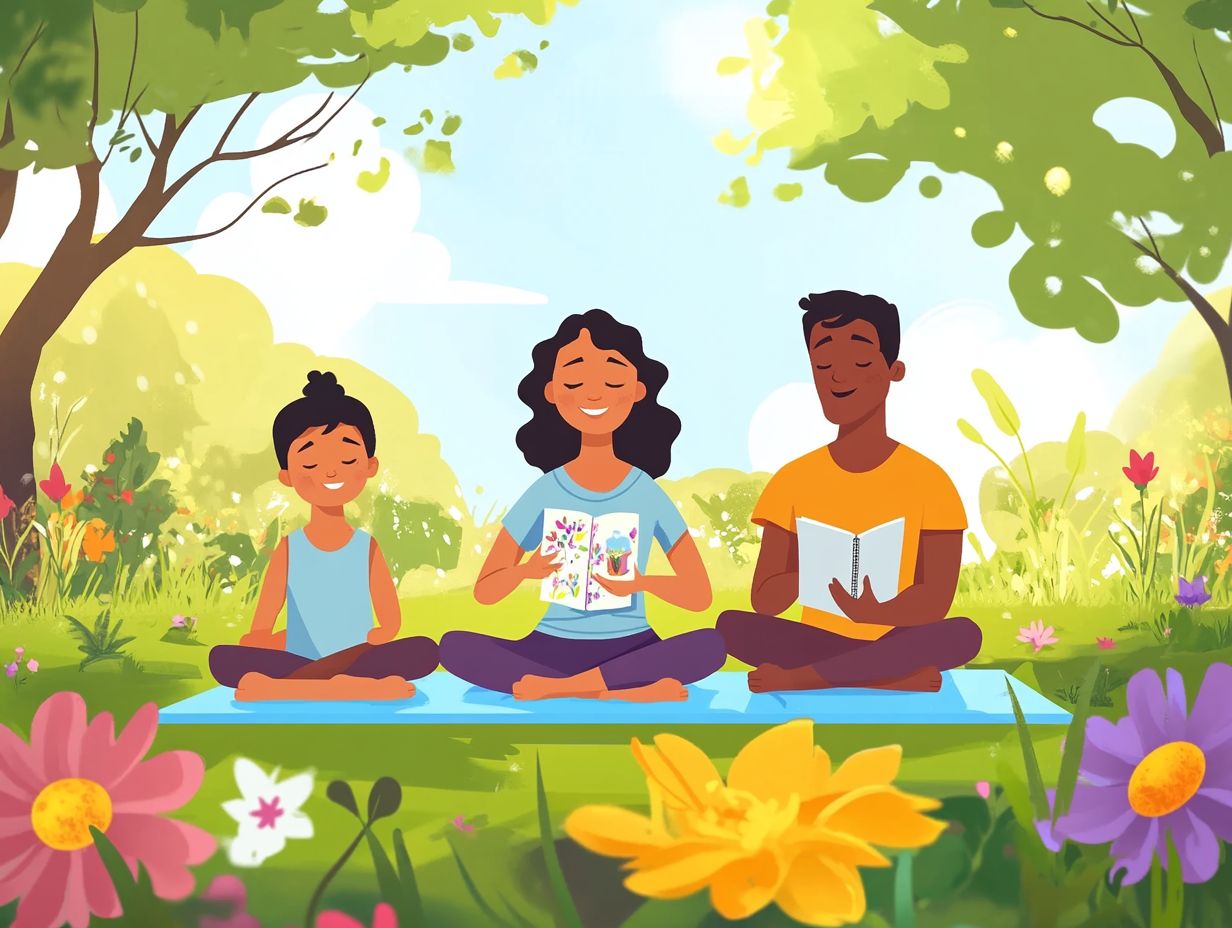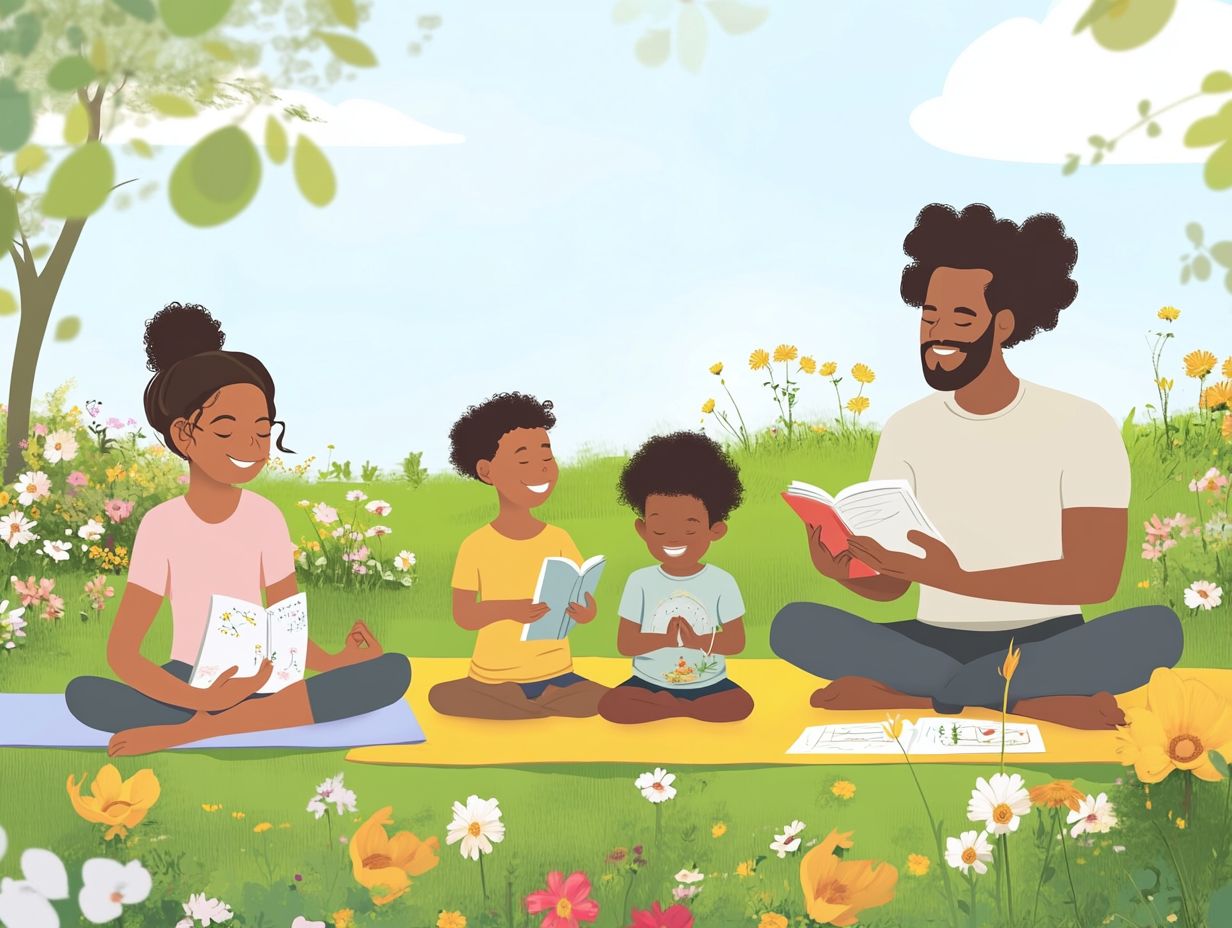Mindfulness Challenges: Fun Family Ideas
Contents
- Mindfulness Activities for Family Bonding
- Key Takeaways:
- 1. Unplugged Family Time with Mindfulness Games
- 2. Mindful Meal Preparation and Eating Techniques
- 3. Nature Walks and Outdoor Activities
- 4. Mindful Crafting and Art Projects
- 5. Family Yoga or Mindfulness Meditation Sessions
- 6. Mindful Communication Exercises and Techniques
- 7. Gratitude Practice
- 8. Mindful Technology Use
- 9. Mindful Games and Activities
- 10. Family Mindfulness Retreat
- How Can Mindfulness Benefit Families?
- Mindfulness in Family Life
- Frequently Asked Questions
- What are some fun mindfulness challenges for families?
- How can mindfulness challenges benefit families?
- What are some simple mindfulness exercises for families?
- Can mindfulness challenges be adapted for kids?
- What are some mindfulness challenges that can be done indoors to improve focus?
- How can families and caregivers stay motivated to continue mindfulness challenges?
Mindfulness Activities for Family Bonding
In today s fast-paced world, carving out quality time to connect with your family can feel like an uphill battle. Mindfulness emerges as a powerful solution, enabling you to engage meaningfully with one another while nurturing emotional well-being and addressing attention problems.
This article offers a variety of enjoyable and practical mindfulness activities tailored to strengthen family bonds. From unplugged quality time and mindful meal preparation to adventurous outings and creative projects, there s something for everyone, including preschoolers and children with ADHD.
Explore how these captivating practices can enrich your family dynamics, enhance cognitive function, and foster a more balanced, joyful home life.
Key Takeaways:

- Unplugged family time leads to deeper connections.
- Mindful meals promote gratitude and self-regulation.
- Nature activities teach mindfulness and appreciation.
1. Unplugged Family Time with Mindfulness Games
Unplugged family time helps create mindful interactions between you and your children. It allows you to savor quality moments without distractions. This intentional time together is essential for fostering well-being. It also boosts emotional awareness and strengthens your relationships.
It lays the groundwork for teaching mindfulness practices, enhancing emotional regulation, and sharpening social skills. This enables you to prioritize your children’s mental health through shared activities.
Engaging in pursuits like nature walks, arts and crafts, or even classic board games creates an ideal setting for mindfulness. These activities offer a perfect opportunity for you and your family to practice deep breathing exercises and other mindfulness exercises, encouraging your children to pause and reflect on their feelings.
As a caregiver, you have a pivotal role in modeling presence and guiding conversations about emotions. This helps your children develop essential emotional awareness. The long-term advantages of these unplugged moments can lead to improved mental health, resilience, and stronger family bonds. These create a nurturing environment where both you and your children feel valued and understood. Educators and parents alike can benefit from these shared experiences.
2. Mindful Meal Preparation and Eating Techniques
Mindful meal preparation and eating invite you to engage fully in the present moment. It enhances your awareness of food, flavors, and the company you share. Get ready to boost your emotional awareness with this fun practice!
When you take a moment to appreciate the vibrant colors and diverse textures of fruits and vegetables, you cultivate a deeper connection with your meals. You foster an atmosphere of gratitude and mindfulness. This simple act can transform mealtime into a sensory experience, allowing everyone to savor not just the flavors but also the shared moments together. This promotes emotional well-being and reduces anxiety.
Encouraging children to explore these sensory elements helps them develop essential emotional regulation skills, leading to healthier relationships with food. As you prioritize cooking and eating mindfully, you create lasting memories and a strong foundation that supports emotional resilience in your children.
3. Nature Walks and Outdoor Activities
Engaging in nature walks and outdoor activities offers you and your family a wonderful chance to connect with the natural world while nurturing mindfulness. This practice can lead to improved self-regulation and emotional well-being for both children and adults.
By incorporating listening walks, you can heighten your awareness, tuning into the subtle sounds of rustling leaves or chirping birds. This fosters a deeper connection to your environment. You can also integrate mindful breathing exercises into your outings. Encourage everyone to take slow, deliberate breaths while savoring the fresh air and tranquil surroundings.
Consider diving into group activities like nature scavenger hunts or guided meditation sessions in a park. These experiences not only reinforce the importance of being present but also enhance social skills and teamwork.
This approach turns each outing into a valuable opportunity for growth and connection, elevating your family’s time together from a simple walk to a memorable adventure. Gather your family and embark on your first mindful adventure this weekend!
4. Mindful Crafting and Art Projects
Mindfully crafting and engaging in art projects provide you with the perfect avenue to express your creativity while fostering mindfulness. This approach cultivates greater awareness of your feelings as you immerse yourself in the process of creation.
Activities like painting, clay modeling, or creating collages serve as more than just artistic outlets; they offer chances to practice deep breathing and body awareness techniques. By engaging fully in these experiences, you promote a sense of calm and significantly reduce anxiety.
When you involve your family in these activities, discussing the emotions that arise from the artworks reinforces the importance of positive self-talk. This can align with mindfulness practices like those advocated by Eckhart Tolle.
Crafting together nurtures teamwork and emotional intelligence, creating a safe space for everyone to articulate their feelings. This collaborative process strengthens family bonds, enriching your connections with one another.
5. Family Yoga or Mindfulness Meditation Sessions
Engaging in family yoga or meditation sessions is an exciting way for children to develop self-regulation skills while promoting inner peace and emotional well-being through structured mindfulness techniques.
By involving the entire family in these activities, you strengthen bonds and cultivate a shared understanding of calmness and concentration. Incorporating exercises like simple breathing techniques and gentle stretches enhances focus and cognitive function.
Creating a calm-down corner in your home can be valuable; this dedicated space should be adorned with comfortable cushions and mindfulness resources. Here, you and your family can read, journal, or engage in guided meditations together, fostering a supportive environment.
Start your family s journey to mindfulness today with these enriching activities! The Mindfulness for Children app or the Smiling Minds app can be very helpful resources.
6. Mindful Communication Exercises and Techniques

Engaging in mindful communication exercises can truly elevate your children’s social skills and emotional regulation, imparting the invaluable lessons of active listening and empathetic responses within family dynamics. These practices emphasize the mindfulness benefits of effective communication.
By incorporating practices like positive self-talk where family members uplift one another with affirming language and participating in active listening activities, you can cultivate a supportive atmosphere at home.
For example, when your child expresses their feelings about an experience at school, take the opportunity to reflect back what you hear, thereby validating their emotions. These techniques not only promote understanding but also fortify the emotional connections within your family, fostering a harmonious environment.
With consistent application over time, these practices can transform family dynamics, making communication more open and less judgmental. This ultimately equips your children with the tools they need to navigate healthier social interactions beyond the home.
7. Gratitude Practice
Incorporating gratitude practices into your family routines can significantly enhance your children’s emotional well-being, fostering mindfulness and encouraging positive self-talk as they reflect on the good in their lives. Educational resources like those from Mindful Schools and the Child Mind Institute can be very beneficial.
When you and your family engage in gratitude exercises together whether it’s maintaining gratitude journals or sharing daily moments of thankfulness around the dinner table you not only strengthen your emotional bonds but also create an open atmosphere where feelings flow freely. These practices cultivate resilience, enabling your children to tackle challenges with a more optimistic outlook.
By recognizing and celebrating the small victories and joys in daily life, you foster a sense of belonging and appreciation that forms the foundation of a supportive home environment.
Ultimately, these shared exercises can lead to an uplifted mood across the family, strengthening relationships and promoting a collective ethos that values positivity and connection.
8. Mindful Technology Use
Teaching children about mindful technology use is crucial in today’s digital landscape. It enables them to become aware of their screen time and its effects on their mental health and overall well-being. Mindfulness strategies can be very effective in managing technology use.
To achieve this effectively, you can implement strategies like creating specific technology-free zones in your home or setting designated times for device usage. These practices foster an environment that prioritizes genuine real-world interactions. Encouraging outdoor activities, family game nights, or reading together can significantly strengthen your connections while reducing reliance on screens. Mindfulness apps can also help manage screen time.
Additionally, incorporating mindfulness apps designed for children can further enhance their emotional resilience by offering guided meditations and relaxation techniques. These mindfulness practices foster emotional awareness and inner peace, helping children manage anxiety and improve their mental health.
By integrating these practices into your daily routines, you can help nurture healthier relationships with technology, paving the way for your children to thrive both online and offline.
9. Mindful Games and Activities
Mindful games and activities, such as mindfulness meditation, can truly be a transformative way to cultivate mindfulness skills in children. These practices enhance cognitive abilities while promoting social-emotional learning and social skills through engaging and interactive experiences.
These activities provide a wonderful opportunity for families to bond and create meaningful moments together. For instance, mindful breathing games encourage everyone to focus on their breath. This simple practice helps calm the mind and manage emotions.
Another engaging activity is listening walks, where family members take turns identifying the sounds around them. It s exciting how this fosters deep listening skills and nurtures an appreciation for nature. Engaging in such practices nurtures individual mindfulness while cultivating an atmosphere of cooperation and empathy. This allows family members to truly understand each other s feelings and perspectives in a supportive environment.
10. Family Mindfulness Retreat
Hosting a family mindfulness retreat presents a remarkable opportunity to deepen connections and enhance overall well-being. Imagine engaging in mindfulness training and exploring emotional management in a tranquil setting designed just for you and your loved ones.
In this serene environment, you can unwind from the stresses of daily life and refocus on what truly matters each other. Activities like guided meditation, nature walks, mindfulness games, and creative expression workshops foster a sense of community while inviting personal reflection.
You can also enjoy yoga sessions tailored for all ages, promoting not only physical health but also emotional balance. As you share your experiences and insights with one another, you ll cultivate empathy and understanding, transforming your interactions long after the retreat has ended.
The skills and practices you acquire during this time can significantly improve communication and resolve conflicts, paving the way for healthier family dynamics and enriching each individual’s emotional well-being.
How Can Mindfulness Benefit Families?
Mindfulness greatly enhances family life by promoting emotional awareness, improving communication, and cultivating an overall sense of well-being that supports mental health for every family member. When you and your family practice mindfulness together, you create a deeper understanding of each other’s feelings and reactions, leading to better emotional management.
This newfound emotional intelligence enables you to respond to stress and conflict with patience and empathy instead of reacting impulsively. As a result, your family relationships grow stronger, with open lines of communication building trust and connection.
Engaging in mindfulness encourages each of you to be fully present in both joyful moments and challenging times. This fosters a harmonious home environment where everyone feels valued and supported. Ultimately, these benefits not only enhance your individual mental health but also contribute to a cohesive family dynamic that thrives on understanding and compassion.
What Are Some Common Challenges Families Face When Trying to Practice Mindfulness Together?

Families often face challenges when trying to practice mindfulness together, such as attention difficulties like ADHD and anxiety, along with maintaining focus amid the chaos of a busy household. These hurdles are frequently exacerbated by the countless distractions that characterize daily life, including electronic devices, work commitments, and the relentless pace of family schedules.
To effectively tackle these challenges, you can establish a designated quiet time for mindfulness practice, incorporating short sessions that seamlessly fit into your hectic lives.
Engaging in simple, age-appropriate mindfulness activities like deep-breathing exercises or nature walks can help create a shared sense of calm. Practices such as these promote emotional management and help mitigate attention problems.
By cultivating a peaceful environment free from interruptions, you ll enhance focus and encourage regular participation, ultimately strengthening your family s connection and promoting overall well-being.
Mindfulness in Family Life
How Can Families Overcome These Challenges?
You can overcome mindfulness challenges as a family by implementing specific strategies that encourage participation, promote emotional regulation, and cultivate a supportive atmosphere for practicing mindfulness.
Establish regular practice times whether in the morning or evening where everyone gathers to engage in mindfulness activities. This consistency reinforces the habit and fosters a sense of community and shared purpose among family members.
Creating a calm environment is essential. Minimize distractions by turning off devices or selecting a serene space; this can significantly enhance the effectiveness of these practices.
Explore various mindfulness resources, such as guided meditation apps, books, or workshops. These resources offer structured activities tailored to different age groups and interests. This exploration can deepen your family s collective understanding and engagement in mindfulness.
What Are Some Tips for Incorporating Mindfulness into Daily Family Life?
Incorporating mindfulness into your daily family life is within reach through simple tips and routines that foster awareness, emotional benefits, and overall mental health, even amidst the hustle and bustle of everyday activities.
These strategies encourage you and your family to slow down and truly savor the moments that often get overlooked. This ultimately deepens your connections with one another. Practice mindful eating by focusing on the colors, textures, and flavors of the food. This cultivates a sense of gratitude for the meal.
Before meals, engage in deep breathing exercises. This allows everyone to pause and set positive intentions, creating a serene dining atmosphere.
Spend a few moments each day reflecting on gratitude. This practice can uplift everyone’s spirits, making mindfulness an effortless yet integral part of your lives.
How Can Parents Encourage Their Children to Practice Mindfulness?
You can foster mindfulness in your children by providing encouragement, introducing engaging exercises, and offering access to mindfulness resources that resonate with their active imaginations.
Actively model mindful behavior. This creates a living example of how being present can enhance daily experiences. Introduce mindfulness games like breathing exercises cleverly disguised as fun activities or thoughtful storytelling. This makes the process enjoyable rather than a chore.
Utilize mindfulness apps specifically crafted for children. These offer interactive tools that guide them through the concepts of awareness and relaxation. Remember, the journey toward mindfulness should remain playful and lighthearted, allowing your children to explore their emotions and thoughts in a safe and creative environment.
What Are Some Creative Ways to Make Mindfulness Fun for the Whole Family?
Making mindfulness enjoyable for the entire family requires a touch of creativity that engages both children and parents, transforming traditional practices into delightful activities that enhance connection and awareness.
Consider introducing captivating mindful art projects, such as collaborative painting sessions. Everyone can contribute their unique flair. This is a fun way for family members to share their emotions and ideas together while adding a layer of fun to the process.
Engage in sensory activities that explore textures, scents, and sounds. This invites children to fully immerse themselves in the present moment while sharpening their observational skills and enhancing their sensory development.
Outdoor adventures like mindfulness scavenger hunts inspire exploration and a deeper appreciation of nature, creating shared experiences that strengthen family bonds.
These activities do more than just foster creativity and awareness; they help families cultivate a sense of unity, making mindfulness a treasured aspect of their everyday lives.
Frequently Asked Questions
What are some fun mindfulness challenges for families?

Some fun mindfulness challenges for families include creating a calm-down corner, a gratitude jar, and going on a mindful nature walk. Additionally, practicing deep breathing exercises together promotes mindfulness benefits for children.
How can mindfulness challenges benefit families?
Mindfulness challenges can benefit families by promoting bonding and reducing stress and anxiety. They also improve communication and self-awareness, supporting emotional well-being and providing a solid foundation for developing mindfulness skills.
What are some simple mindfulness exercises for families?
Simple mindfulness exercises for families include mindfulness meditation, mindful breathing, body awareness activities, and positive self-talk exercises. These practices instill inner peace and emotional balance, fostering a harmonious home environment. Techniques like mindful eating, body scans where you pay attention to different parts of your body to release tension and guided meditations can enhance awareness and promote inner peace.
Can mindfulness challenges be adapted for kids?
Absolutely! Mindfulness challenges can be made more interactive and fun for kids by incorporating mindfulness games, activities, or mindful art projects. This adaptation helps improve social skills and emotional benefits.
What are some mindfulness challenges that can be done indoors to improve focus?
Some mindfulness challenges that can be done indoors to improve focus include creating a family vision board, practicing mindful coloring, doing a family yoga session, and engaging in mindfulness activities like a listening walk or setting up a calm-down corner.
How can families and caregivers stay motivated to continue mindfulness challenges?
Families can stay motivated to continue mindfulness challenges by setting realistic goals and celebrating small successes. Involving everyone in the planning process can enhance commitment. Utilizing mindfulness apps and resources from organizations like Mindful Schools or the Child Mind Institute can provide additional support and strategies.




